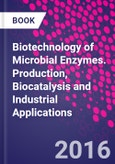Biotechnology of Microbial Enzymes: Production, Biocatalysis and Industrial Applications provides a complete survey of the latest innovations on microbial enzymes, highlighting biotechnological advances in their production and purification along with information on successful applications as biocatalysts in several chemical and industrial processes under mild and green conditions.
Applications of microbial enzymes in food, feed, and pharmaceutical industries are given particular emphasis. The application of recombinant DNA technology within industrial fermentation and the production of enzymes over the last 20 years have produced a host of useful chemical and biochemical substances. The power of these technologies results in novel transformations, better enzymes, a wide variety of applications, and the unprecedented development of biocatalysts through the ongoing integration of molecular biology methodology, all of which is covered insightfully and in-depth within the book.
Please Note: This is an On Demand product, delivery may take up to 11 working days after payment has been received.
Table of Contents
Chapter 1. Useful Microbial Enzymes-An Introduction
Chapter 2. Production, Purification, and Application of Microbial Enzymes
Chapter 3. Solid State Fermentation for Production of Microbial Cellulases
Chapter 4. Hyperthermophilic Subtilisin-Like Proteases From Thermococcus kodakarensis
Chapter 5. Enzymes from Basidiomycetes-Peculiar and Efficient Tools for Biotechnology
Chapter 6. Microbial Production and Molecular Engineering of Industrial Enzymes: Challenges and Strategies
Chapter 7. Metagenomics and the Search for Industrial Enzymes
Chapter 8. The Pocket Manual of Directed Evolution: Tips and Tricks
Chapter 9. Insights into the Structure and Molecular Mechanisms of ?-Lactam Synthesizing Enzymes in Fungi
Chapter 10. The Cellulosome: A Supramolecular Assembly of Microbial Biomass-Degrading Enzymes
Chapter 11. Microbial Enzymes of Use in Industry
Chapter 12. Significance of Microbial Glucokinases
Chapter 13. Lipase-Catalyzed Organic Transformations: A Recent Update
Chapter 14. Enzymatic Biocatalysis in Chemical Transformations: A Promising and Emerging Field in Green Chemistry Practice
Chapter 15. Microbial Enzymes for Glycoside Synthesis: Development of Sucrose Phosphorylase as a Test Case
Chapter 16. Industrial Applications of Multistep Enzyme Reactions
Chapter 17. Biocatalysis for Industrial Production of Active Pharmaceutical Ingredients (APIs)
Chapter 18. Agro-Industrial Residues and Microbial Enzymes: An Overview on the Eco-Friendly Bioconversion into High Value-Added Products
Chapter 19. Microbial Enzymes for the Food Industry
Chapter 20. Productive Chain of Biofuels and Industrial Biocatalysis: Two Important Opportunities for Brazilian Sustainable Development








